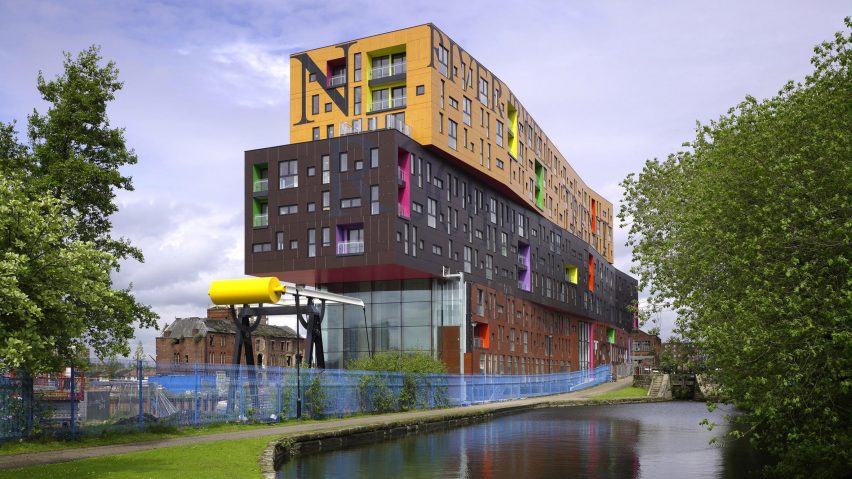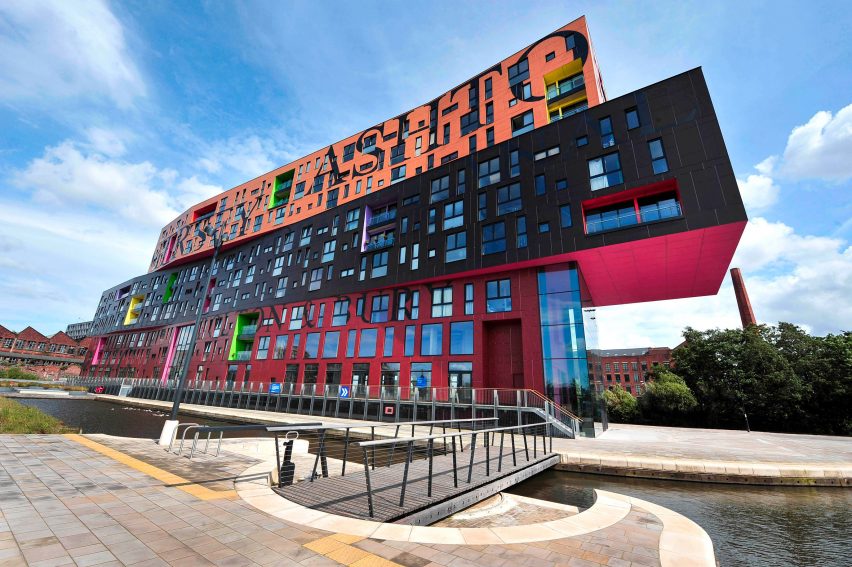
Cladding of Will Alsop's Chips apartment block has "non fire retardant" written on it
Cladding panels have been found with "non fire retardant" written on them at the Will Alsop-designed Chips apartment block in Manchester, UK, in a safety review following the Grenfell Tower fire.
The labels were found on the rear of panels that were removed from the 142-flat apartment building during a risk assessment, according to a report in the Manchester Evening News.
Chips was one of the hundreds of tall buildings in the UK that were re-tested following the devastating Grenfell Tower fire, in which 71 people died. It failed this risk assessment, which was carried out by Greater Manchester Fire and Rescue Service (GMFRS).
Yet the eight-storey building was given the green light by a private building inspector when it completed in 2009.
Chips passed inspection in 2009, despite "non fire retardant" cladding
The project, conceived by architect Will Alsop as "three fat chips stacked on top of each other", was built for developer Urban Splash by its own contracting arm Urban Splash Build.
A spokesperson for Urban Splash told Dezeen, "Chips was completed by Urban Splash in 2009, and received Building Regulations Approval, as well as Premier Warranty approval; a full Final Building Control Certificate was then issued in September 2009."

Urban Splash sold the building's freehold to E&J Estates in 2012, and its approvals and certificates were valid at the time of the sale.
The building is clad in a composite wall faced with a cladding covered in newspaper print with text that echoes the industrial heritage of the Ancoats area. These cladding panels are formed from a fibre composite known as Trespa.
The building is currently managed by Residential Management Group (RMG). Speaking to the Manchester Evening News, Justin Herbert, operations director at RMG, confirmed that, "the Trespa panel, which is the original material installed on the building when it received the final building control certificate in September 2009, removed as part of the analysis did state non fire retardant".
Residents billed £175,000
Since the inspection, RMG has appointed 24-hour fire wardens to allow the building to remain open. The management company has billed the residents £175,000 for the cost of the wardens, along with the specialist assessment of the cladding and minor building alterations.
Some residents are refusing to pay the bill of up to £2,700 per flat, the first payment of which was due on Christmas Day, with one homeowner telling the Manchester Evening News that: "Although it's [the news about non fire retardant being written on the cladding] shocking, in all honesty, I feel better knowing this as it makes our case even stronger for not paying."
This cost will not pay for the replacement of the cladding at the apartment.
Although Urban Splash has sold the property, it is continuing to work with the residents, owners and the managing agents.
The spokesperson continued "Urban Splash has taken an active part of the post-Grenfell review not only on Chips but across our portfolio. We also continue to participate within the GMFRS private housing providers forum."
Landlords should not pass on costs, says government
An interim report of the review of building regulations commissioned in the wake of Grenfell highlighted that current regulations were unfit for purpose because there are too many opportunities to take short cuts.
According to The Guardian, 262 towers across the UK were found to have faulty cladding in the wake of the Grenfell tragedy.
While the cost of alterations and replacing cladding to make these towers safe is being absorbed by the landlords in local authority housing, private landlords are passing this cost onto the residents.
In Croydon, residents of a high-rise block have been told to pay £2 million to replace Grenfell-style cladding, with each home liable for £31,000.
A spokesperson for the Ministry of Housing, Communities and Local Government told Dezeen: "Keeping people safe in their homes is paramount. We are clear we want to see private sector landlords follow the lead of the social sector and not pass on the costs of essential safety measures to leaseholders."